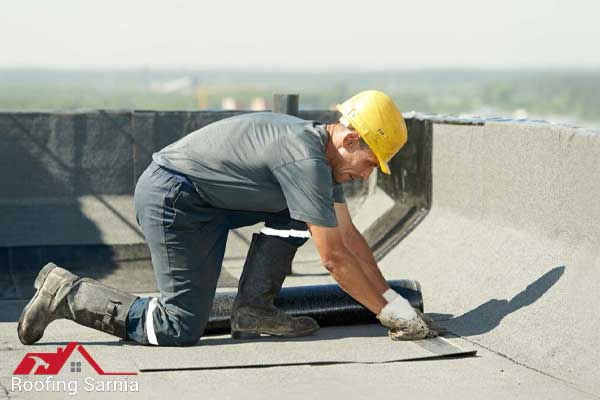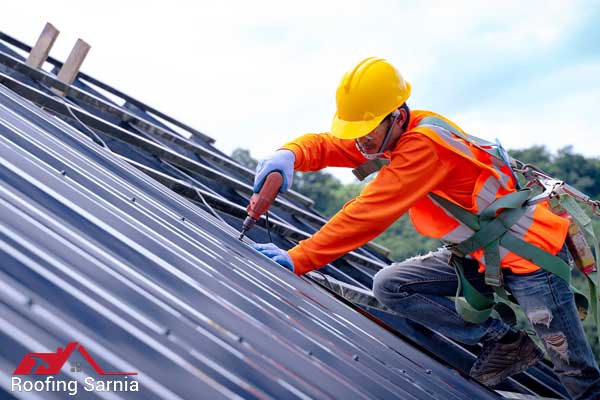In the vast expanse of the construction industry, various professionals play unique and essential roles, ensuring our buildings are safe, functional, and aesthetically pleasing. Among these unsung heroes is the commercial roofer, a specialist whose expertise often goes unnoticed, yet is paramount to the longevity and safety of commercial structures. But what exactly does a commercial roofer do? Beyond just “putting a roof over our heads,” these experts handle intricate tasks that require a blend of technical know-how, craftsmanship, and an understanding of modern architectural trends. This article delves deep into the world of commercial roofing, shedding light on the responsibilities, techniques, and significance of these essential professionals in the contemporary building landscape.
Commercial Roofer’s Duties and Responsibilities:
- Assessment and Planning: Before any roofing work begins, a commercial roofer is responsible for assessing the condition of an existing roof or analyzing architectural plans for new constructions. This involves understanding the building’s needs, potential challenges, and the best materials and methods to use.
- Material Selection: Commercial roofs differ from residential roofs in terms of scale and material requirements. A commercial roofer selects the most suitable materials, such as thermoplastic, EPDM, modified bitumen, or metal roofing, based on the building’s needs, climate, and budget.
- Installation: This is the core duty of any roofer. For commercial roofers, this might involve installing large flat roofs or ensuring that the roofing on skyscrapers is both functional and aesthetically pleasing. Proper installation is crucial to prevent leaks, ensure durability, and maintain structural integrity.
- Maintenance and Repairs: Over time, roofs face wear and tear due to environmental factors or unforeseen incidents. Commercial roofers perform regular inspections and undertake necessary repairs, such as replacing damaged sections, sealing leaks, or addressing drainage issues.
- Weatherproofing: Commercial buildings often house sensitive equipment or stock. A commercial roofer ensures that roofs are not just sturdy but also resistant to elements like rain, wind, snow, and extreme temperatures, ensuring the contents inside remain protected.
- Safety Protocols: Given the scale and height of many commercial buildings, safety is paramount. Commercial roofers must adhere to strict safety guidelines, use appropriate safety gear, and ensure that the worksite is safe for all involved.
- Staying Updated: The construction industry is ever-evolving, with new materials, techniques, and technologies emerging regularly. A commercial roofer’s responsibility includes staying updated on these advancements to provide the best solutions to clients.
- Client Communication: Effective communication with clients is essential. Roofers must provide clear estimates, timelines, and progress reports, ensuring the client’s needs are met and expectations are managed.
- Waste Management: After installations or repairs, commercial roofers are responsible for the proper disposal of old materials, ensuring that the site remains clean and that waste is disposed of in an environmentally friendly manner.
- Team Collaboration: Roofing on commercial properties is rarely a one-person job. Commercial roofers often collaborate with a team, ensuring tasks are completed efficiently, on time, and to the highest standards.
Commercial Roofer Work Environment:
Commercial roofers operate primarily atop commercial structures, ranging from office complexes and retail centers to large storage facilities. Their expertise lies in setting up, mending, and sustaining roofing solutions crafted from diverse materials like asphalt, metal, and ceramic tiles. Their work schedule is typically full-time, but it’s not uncommon for them to extend their hours, including weekends and holidays, to adhere to tight schedules or address urgent roofing crises. Their profession demands them to brave the elements, working outdoors regardless of the weather, often at impressive heights. This makes their job both physically strenuous and fraught with potential hazards. To mitigate risks and ensure their safety, commercial roofers are equipped with protective gear, including helmets, protective eyewear, and durable gloves, ensuring they can carry out their tasks effectively and securely.
Essential Skills of a Commercial Roofer:
To excel as a commercial roofer, one must harness a diverse set of skills, each playing a pivotal role in ensuring top-tier workmanship and client satisfaction:
Effective Communication: A commercial roofer’s role is multifaceted, often involving collaboration with a diverse team, from fellow roofers to various construction professionals. The ability to articulate information clearly and comprehensively ensures seamless operations and minimizes misunderstandings. Furthermore, transparent dialogue with clients guarantees that they remain informed about the procedures, materials, and progress of the project.
Proficiency in Technical Aspects: A commercial roofer’s expertise is grounded in their technical prowess. This encompasses a deep familiarity with a vast array of tools, equipment, and materials, as well as adherence to safety guidelines and regulations. Furthermore, the aptitude to decipher and execute based on architectural blueprints is paramount to delivering a project that aligns with the envisioned design.
Meticulous Observation: The intricacies of roofing demand a keen eye for even the most minute details. Whether it’s ensuring the use of the precise shingle type specified by a client or spotting subtle discrepancies in a project, a roofer’s meticulousness ensures that every aspect of a job aligns with the highest standards, ensuring client satisfaction and structural safety.
Critical Thinking and Problem-Solving: The dynamic nature of construction means that challenges are inevitable. A commercial roofer must possess the ability to swiftly identify issues and craft effective solutions. Whether it’s pinpointing the origin of a roof leak or brainstorming innovative methods to address a unique roofing challenge, their problem-solving skills are integral to navigating and overcoming obstacles.
In essence, while the tools and materials are vital, it’s these core skills that truly define a commercial roofer’s capability, ensuring they deliver impeccable results, maintain strong client relationships, and consistently elevate the standards of their craft.

Commercial Roofer Job Requirements
Entering the world of commercial roofing requires a combination of formal qualifications, hands-on experience, and personal attributes that ensure success in this demanding field. Here’s an overview of the typical job requirements for a commercial roofer:
Education and Training: While a high school diploma or equivalent is often the basic educational requirement, many commercial roofers start their journey through apprenticeship programs. These programs, often sponsored by unions or contractor associations, provide a mix of classroom instruction and on-the-job training. They cover essential aspects like safety protocols, material properties, and advanced roofing techniques.
Licensing and Certification: In many regions, roofers are required to obtain a license to operate. The licensing process usually involves passing an exam that tests knowledge of the trade and local building codes. Beyond mandatory licensing, there are voluntary certifications available, such as those offered by the National Roofing Contractors Association (NRCA). These certifications can enhance a roofer’s credentials and open doors to specialized projects.
Physical Fitness: Given the demanding nature of the job, roofers need to be in good physical condition. They should be comfortable with heights, have good balance, and possess the strength to lift and carry heavy materials.
Experience: While formal education and training are crucial, nothing replaces hands-on experience. Many employers prefer roofers with several years of experience, as it signifies familiarity with various materials, tools, and real-world challenges.
Safety Training: Safety is paramount in the roofing industry. Commercial roofers must be trained in safety protocols, and in some cases, possess certifications in areas like fall protection or hazard communication.
Technical Skills: A proficient roofer should be adept at reading blueprints and architectural plans, understanding different roofing materials, and using a variety of tools, from simple hammers and nails to advanced electronic leak detection equipment.
Soft Skills: Beyond the technical aspects, commercial roofers should possess strong communication skills, as they’ll often interact with clients, suppliers, and team members. Problem-solving abilities, attention to detail, and time management are also vital in ensuring projects are completed efficiently and to the highest standards.
Continued Learning: The construction and roofing industries are continually evolving. A commitment to ongoing education, be it through workshops, courses, or certifications, is essential to stay updated with the latest materials, techniques, and technologies.
In essence, while the barriers to entry in the commercial roofing industry might seem minimal, excelling and building a successful career requires dedication, continuous learning, and a passion for the craft.
Commercial Roofer Work Hours:
The life of a commercial roofer is not your typical 9 to 5 job. Their work hours can vary significantly based on several factors. Here’s an overview:
- Standard Hours: Many commercial roofers start their day early, often around dawn, to take advantage of the cooler morning temperatures, especially during the warmer months. A standard workday is typically 8 hours, but this can extend based on the project’s demands.
- Seasonal Variations: Roofing is heavily influenced by the seasons. In regions with milder winters, roofing can be a year-round job. However, in areas with harsh winters, roofing activities may slow down or halt due to snow, ice, and the risks associated with cold temperatures. Conversely, in extremely hot climates, roofers might avoid working during the peak heat of the day.
- Project Deadlines: Urgent projects or those with tight deadlines might require longer work hours, often extending into the evening or spanning weekends. This is especially true for commercial projects where business operations are affected, and timely completion is crucial.
- Emergencies and Repairs: Roofers might be called upon outside of standard hours for emergency repairs, especially after significant weather events like storms, tornadoes, or hail, which can damage roofs and require immediate attention.
- Off-Peak Work: Some commercial roofing tasks, especially in occupied buildings like malls, offices, or factories, might be scheduled during off-peak hours to minimize disruption to business operations. This could mean working late evenings, nights, or early mornings.
- Overtime: Given the project-based nature of the job, there might be periods of intense activity followed by slower periods. During busy times, roofers might work overtime to meet project demands.

Commercial Roofer Salary
The salary of a commercial roofer can vary widely based on several factors. Geographical location plays a significant role, with roofers in urban areas or regions with a high cost of living often earning more than those in rural areas. Experience and skill level are also key determinants. A novice roofer just starting in the industry will typically earn less than a seasoned professional with years of experience and specialized skills.
Another influential factor is the nature of employment. Roofers employed by large commercial roofing companies might have a stable salary, benefits, and opportunities for overtime, whereas independent contractors or those working for smaller firms might have fluctuating earnings based on the number and scale of projects they undertake. Additionally, as with many trades, certification and continuous professional development can lead to higher earning potential. Roofers who invest in acquiring specialized certifications or skills, such as green roofing or advanced waterproofing techniques, often command higher salaries.
The construction industry’s cyclical nature also impacts a roofer’s earnings. During peak construction seasons or in booming economic times, there might be an abundance of projects, leading to increased income opportunities. In contrast, slower periods, often influenced by economic downturns or adverse weather conditions, can result in reduced earnings.
While the salary of a commercial roofer can be influenced by a myriad of factors, continuous skill development, adaptability, and a keen understanding of market trends can help professionals navigate the industry’s ebbs and flows, ensuring a rewarding and sustainable career.
How to Become a Commercial Roofer?
The journey to becoming a proficient commercial roofer is distinctive and multifaceted. At the core of their expertise lies a profound understanding of diverse roofing materials and the intricate science that governs effective roofing solutions. Additionally, their skill set extends to deciphering architectural blueprints and possessing strong mathematical acumen.
The initial steps into the world of commercial roofing often begin with an apprenticeship, where budding roofers are mentored by seasoned veterans in the field. This hands-on training is complemented by formal education, encompassing courses in construction safety, foundational mathematics specific to construction, and the art of interpreting blueprints. With time and accumulated experience, these professionals can ascend in their careers, taking on roles with greater responsibilities such as supervisory or managerial positions. In essence, the path to becoming a commercial roofer is a blend of practical experience and continuous learning, ensuring they are well-equipped to handle the complexities of the trade.
Conclusion
The world of commercial roofing is a blend of craftsmanship, technical expertise, and continuous adaptation to ever-evolving industry standards and technologies. As we’ve explored throughout this article, commercial roofers play a pivotal role in ensuring the safety, functionality, and longevity of the structures that form our urban landscapes. Their responsibilities extend far beyond mere installation, encompassing intricate tasks that require a deep understanding of materials, architectural trends, and environmental factors. Their skills are honed through rigorous training, hands-on experience, and a commitment to ongoing education. In essence, commercial roofers are unsung heroes of the construction world, working tirelessly to “put a roof over our heads” in the most literal sense. As we step into commercial spaces, be it an office, a shopping mall, or a factory, it’s worth taking a moment to acknowledge the expertise and hard work of these professionals that ensure our safety and comfort from the top down.




